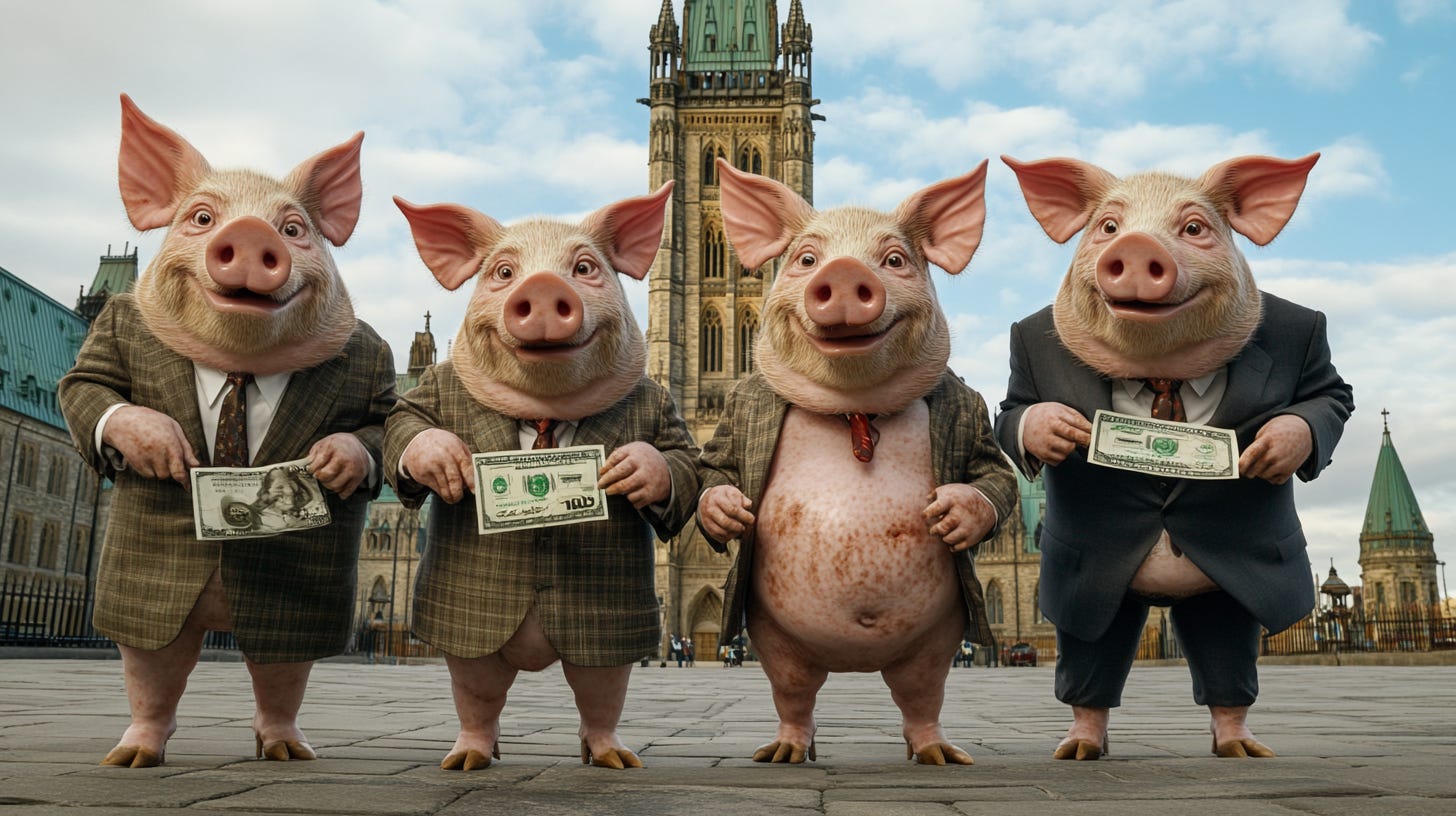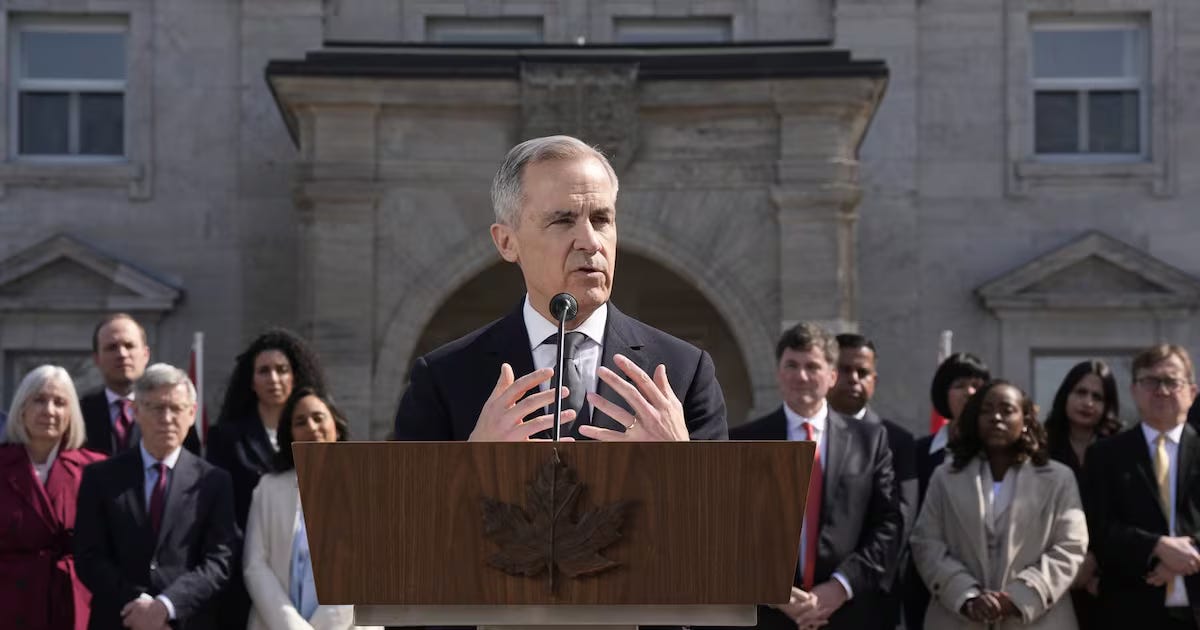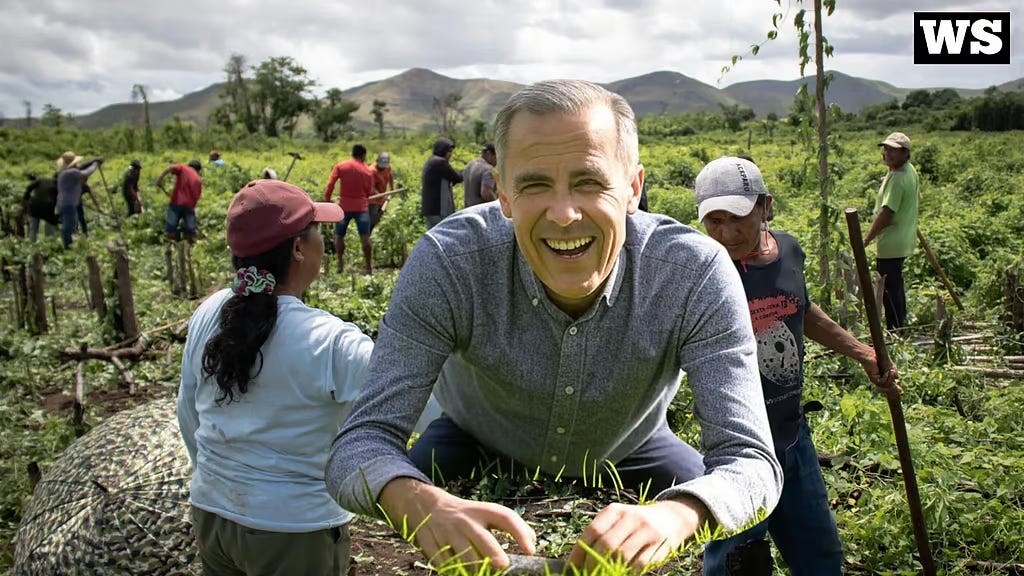Good morning, It’s Thursday, April 10th. In today’s news, we compare the Liberal legacy to Orwell’s Animal Farm, Mark Carney’s “energy superpower” plan is doomed to fail, Canada’s cannabis legalization fulled transnational criminal networks, Trump announces 90-Day pause on reciprocal tariffs but raises levy on China to 125%, and much more.
First time reading the daily blend? Sign up here.
The Liberal Party’s Animal Farm: Equality Promised, Tyranny Delivered
George Orwell’s Animal Farm isn’t just a fable about pigs and power — it’s a warning. A warning about revolutions that promise progress but deliver new forms of tyranny. And if you look closely at Canada today, the parallels are chilling.
In Animal Farm, the pigs lead a rebellion under the banner of equality. At first, it’s all unity and shared sacrifice. But soon, the pigs rewrite the rules, hoard the resources, and rule through fear.
Sound familiar?
In Canada, the ruling pigs aren’t fictional — they’re the Liberal Party. They came to power on promises of sunny ways and social justice. But over time, they centralized control, punished dissent, and rewrote the rules to suit their interests.
Justin Trudeau may play the part of Napoleon — the smiling face of soft authoritarianism — but don’t be fooled. Replacing him with another pig in a different suit, like Mark Carney, doesn’t change the system. The barn remains under the same regime.
And then there’s Squealer, Orwell’s mouthpiece of propaganda:
“You do not imagine, I hope, that we pigs are doing this in a spirit of selfishness and privilege?”
Squealer is the state media — the CBC and government-funded outlets — twisting every failure into a virtue, spinning lies into truth, and defending the regime at all costs.
Boxer, the loyal workhorse, lived by one principle: “I will work harder.”
He is the Canadian taxpayer, crushed by inflation, housing costs, and endless bureaucracy. But like Boxer, he’s discarded the moment he’s no longer useful.
The sheep repeat whatever they’re told: “Four legs good, two legs bad.”
In Canada, they chant, “Follow the science,” “Carbon Tax Good,” or “Diversity is our strength.” Never questioning — only obeying. And if doubt creeps in, they’re reminded, “Surely, you don’t want Harper back?” — a fear trigger to keep them in line.
And the windmill — Orwell’s great symbol of empty promises — was meant to make life easier. But it became a tool of control, keeping the animals busy and distracted. In Canada, that windmill is the Green Energy Revolution — a utopian fantasy used to justify crushing taxes, massive spending, and elite profiteering, while ordinary people freeze, pay more, and get less.
Even the commandments are rewritten. Charter rights become privileges.
During the Freedom Convoy, the Liberals unconstitutionally invoked wartime measures against peaceful protestors. Free speech became hate speech. Equality turned into equity. And a true justice system was replaced by two-tier enforcement and DEI hiring quotas — where your identity matters more than your merit.
That’s Canada today.
Different name. Same game.
Mark Carney’s “Energy Superpower” Plan: A Fantasy Doomed to Fail
Mark Carney’s latest pitch to transform Canada into a “leading energy superpower” sounds like a bold vision, but it’s little more than a hollow promise—a flashy campaign stunt that crumbles under scrutiny. Carney’s plan to reduce Canada’s reliance on the US, lean into green energy, diversify trade, and boost long-term competitiveness is riddled with practical impossibilities, economic miscalculations, and political naivety. Here’s why Carney’s grand vision is destined to flop:
First, the idea of reducing Canada’s reliance on the US for energy sounds bold, but the details reveal a weak approach. Carney’s plan hinges on increasing domestic energy production and developing “clean energy,” but these two goals are far from aligned. Canada's clean energy infrastructure is not nearly ready to meet the country's needs, and the pace of development would never be fast enough to replace US imports in any meaningful way. Building clean energy projects takes time, money, and technological advancements that we simply don’t have on the scale he’s envisioning.
The plan to invest in critical minerals, recycling, and supply chain connections is more of the same vague promises that sound good in theory but lack practical feasibility. Mining critical minerals at the scale required to power clean energy projects is a massive undertaking, and Canada's regulatory environment, coupled with high costs, means that it will be incredibly difficult to ramp up production in any meaningful way. Moreover, Carney’s reliance on Indigenous communities to support these projects raises red flags. While engaging Indigenous groups is necessary, the government has a history of ignoring their rights when it comes to major energy projects, making this promise more of a convenient checkbox than a real commitment.
The $5 billion for a “Trade Diversification Corridor Fund” to build national energy corridors is yet another empty promise. Canada’s energy infrastructure is already deeply entrenched in US markets, and there is no indication that diverting resources into these projects will pay off in the near term. The reality is that energy infrastructure projects take decades, not the quick turnaround Carney is suggesting. In fact, only 22% of the oil and gas we currently export to the US can be redirected elsewhere. To increase that number, we’d need to build new pipelines and expand infrastructure. The cost of developing these corridors would also likely outweigh the economic benefits, especially when most of Canada's energy is still destined for US markets.
Lastly, Carney’s comments about balancing the federal budget without pursuing austerity are laughable. The kind of infrastructure and energy projects he’s proposing will require billions in investment, not just over a few years but likely over decades. The math simply doesn’t add up—how can he promise both economic growth and budget balance without introducing new taxes or deep cuts elsewhere?
Carney’s plan might sound good in theory, but the reality is that it’s full of holes, short-sighted, and woefully disconnected from the realities of Canada’s energy and economic landscape. Instead of being a visionary approach, it’s more of a desperate attempt to appease voters with feel-good rhetoric that won’t ever materialize.
Cannabis Legalization Was Supposed to Help Canadians—It Empowered Transnational Crime
In 2018, Justin Trudeau promised Canadians a safer, more regulated society through cannabis legalization. What we got instead was a transnational narco network—fueled by loopholes, fraud, and the exploitation of Health Canada’s own licensing system—now deeply rooted across rural Ontario and beyond. And much of it, according to law enforcement and investigative reports, is tied to Chinese criminal syndicates with links back to the Chinese Communist Party.
Recent RCMP charges against six individuals in Milton, Ontario, have unveiled just one node in a sprawling criminal web. The suspects used stolen identities to secure Health Canada licenses, employed illegal Chinese migrants as live-in workers, and laundered millions through Canadian banks. Police say the cannabis was bound for the U.S., Hong Kong, and potentially Europe—effectively weaponizing Canada’s legalization regime into a global smuggling pipeline.
This isn’t an isolated incident. Similar black-market grow ops have exploded across Ontario and British Columbia, from the Thousand Islands to Scarborough. Back in 2020, Project Woolwich exposed $42 million in illegal cannabis smuggling and seized over $3 million in multi-currency cash—Canadian, American, Chinese, and Korean. And in the U.S., related busts from Oklahoma to Maine show that Chinese mafia groups are using legal cover to traffic tens of thousands of pounds of marijuana, alongside fentanyl, ketamine, and other synthetic drugs.
The epicentre of this boom has been Ontario farmland—cheap, remote, and now riddled with grow-ops tied to shell companies and fraudulent mortgages. Experts and law enforcement have been sounding the alarm for years, but the Liberal government has done little to close the regulatory loopholes that are now blatantly exploited by transnational crime.
Health Canada’s licensing system, under the Cannabis Act, has become a Trojan Horse. What was sold to the public as progressive drug policy has been repurposed into a pipeline for organized crime—one with direct ties to hostile foreign interests.
The consequences? A multibillion-dollar black market. Human trafficking. Money laundering. And Canada’s complicity—whether through incompetence or willful blindness—in facilitating CCP-backed drug empires on both sides of the border.
This isn’t about weed anymore. It’s about national security. Source.
Trump Announces 90-Day Pause on Reciprocal Tariffs But Raises Levy on China to 125%
President Trump announced a 90-day pause on new reciprocal tariffs—except for China and a few key exceptions like Canada. While most countries will now face a flat 10% tariff, China’s rate has been hiked to 125%, and Canada continues to face higher tariffs on specific sectors, including 25% on goods not covered under the USMCA, and targeted tariffs on fentanyl-related items.
Trump said more than 75 countries have chosen diplomacy over retaliation, but he slammed China for showing a “lack of respect” in trade and vowed that the days of China exploiting the US are over. Wall Street surged in response, with the S&P 500 and Nasdaq posting record one-day gains.
Treasury Secretary Scott Bessent said the tariff revenue—expected to hit $300–600 billion annually—will fund tax cuts for working Americans. He also warned that countries pivoting toward China could face consequences. Despite the pause, Canada remains one of the hardest-hit allies in Trump’s trade overhaul. More
Carney’s Brookfield Implicated in Slave Labour and Indigenous Violations
Liberal leader Mark Carney’s former company, Brookfield Asset Management, is facing serious allegations of breaching Indigenous rights in Canada, the US, Brazil, and Colombia. The accusations include environmental damage, treaty violations, and human rights abuses related to the construction of dams, wind farms, and other infrastructure.
Carney, who chaired Brookfield until announcing his Liberal leadership bid in January, was caught lying about his involvement in the company’s controversial move from Toronto to the US in late 2024. Despite his claims of resignation, internal documents revealed his role in the decision. Between 2020 and 2024, Brookfield was accused of serious abuses, including deforestation in Brazil, Indigenous resistance in Colombia, a $100-million lawsuit in Ontario from a First Nation, and an environmental dispute in Maine.
Carney’s corporation also faces a lawsuit from the Mississauga First Nation in Ontario, alleging Brookfield’s refusal to engage in a benefits-sharing agreement related to four dams on the Mississagi River. While Carney and Brookfield deny any wrongdoing, they remain under intense scrutiny. More
Ukrainian Intelligence Has Identified 155 Chinese Citizens Fighting for Russia - More
Trump Administration Freezes $1 Billion in Funding for Cornell University and $790 Million for Northwestern University - ”The money was frozen in connection with several ongoing, credible, and concerning Title VI investigations,” a Trump administration official said. More
Coast Guard Offloads 48,000 Pounds of Seized Drugs Worth $500 Million at South Florida Port - More
ICE: 4 Chinese Nationals Face Deportation Following $1.2 Million Identity Theft Scheme - More
Tesla Soars 22.7% in Second-Biggest Daily Gain Ever
Tesla's stock price surged by 22.69% yesterday, marking the second-highest single-day percentage gain in its history. This increase added approximately $140 billion to Tesla's market capitalization, with the stock closing at $272.20. The only larger daily gain occurred in May 2013 when Tesla announced its first quarterly profit. This significant rise in stock value also boosted Elon Musk's net worth by an estimated $15 to $20 billion. The trading volume was notably high, and the event has been widely discussed among investors and financial observers.
Billionaire With Links to the Chinese Communist Party Wants to Buy the Hudson’s Bay Company - More
Trump Tells Countries to Axe Talks on Shipping Carbon Tax… Or Else - This would put a damper on Carney’s new carbon tax plan. More
iPhones Could Triple in Price—to Nearly $5,000 CAD—If They Have to be Made in the US - More
Study: Saturn's Moon Titan Could Harbor Life—But Only a Tiny Amount
Titan, Saturn’s largest moon, has long intrigued scientists with its methane lakes, icy terrain, and rich organic chemistry. A new study led by researchers from the University of Arizona and Harvard suggests that if life exists on Titan, it likely lives deep in the subsurface ocean—possibly supported by fermentation using simple molecules like glycine. However, due to limited organic transfer from the surface to the ocean, any potential biosphere would be extremely small—just a few kilograms total. NASA’s Dragonfly mission, launching in 2028, may help determine if even this minimal life exists. More
If it does, do aliens technically exist?
Scientists Uncover 100,000 Submerged Mountains Beneath the Ocean Floor in Breakthrough Map - More
Weezer Bassist’s Wife Shot by LA Police and Booked for Attempted Murder
Jillian Lauren, wife of Weezer bassist Scott Shriner, was shot by LAPD officers on Monday during a hit-and-run investigation in Los Angeles. Police were searching for suspects in the Eagle Rock neighbourhood when Lauren, 51, reportedly exited her home holding a handgun. Officers say they ordered her to drop the weapon multiple times and opened fire when she allegedly pointed it at them. She was treated at a local hospital for a non-life-threatening gunshot wound. Though not involved in the hit-and-run, Lauren was later absentee booked for attempted murder. She and her babysitter, who also emerged from the house, were briefly detained but released. More
Masters 2025: Rory McIlroy, Scottie Scheffler & Jon Rahm lead contenders at Augusta National—Here are the Dark Horse Picks, Sleepers and Long Shot Predictions - More
Vladimir Guerrero Jr. Reportedly Gets $325M Signing Bonus in $500M Blue Jays Contract - More
James Toback Hit With $1.7 Billion Verdict in Sex Assault Suit Involving 40 Women - More
Man Develops Fungal Lung Infection Due to Dirty Sock Smelling Habit - WTF
China Court Auctions Off 100 Tons of Live Crocodiles For Half a Million Dollars—But Winner Must Pick Up Lot at Their Own Risk - Also WTF
On This Day in 1972 The US, USSR and 70 other nations agree to ban biological warfare at the Biological Weapons Convention



















Canada is so fkd.